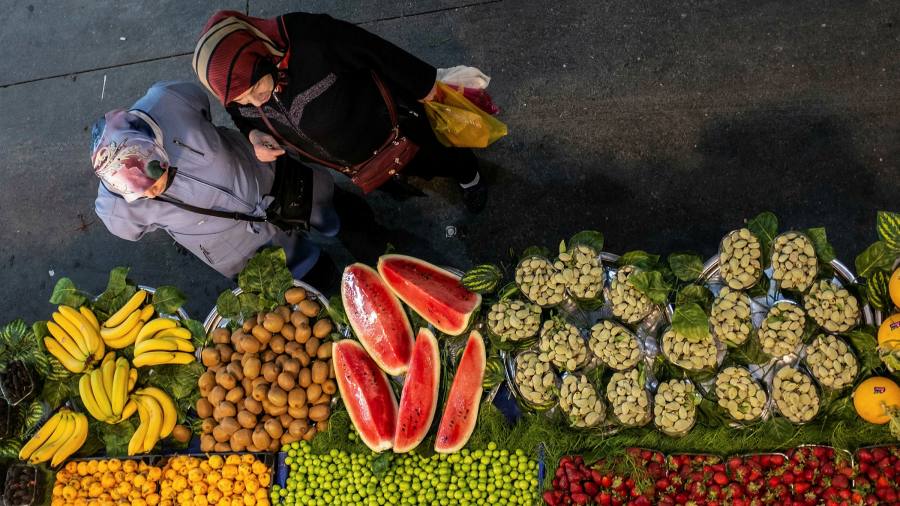An old saying attributed to a former president has become popular in Turkey as people have confronted astronomical price rises in recent months: “There is no government that cannot be brought down by an empty cooking pot.”
As a shrewd political operator gearing up for a re-election bid within a year, Recep Tayyip Erdoğan might be expected to heed the warning of a predecessor by tackling inflation that has hit an official rate of almost 80 per cent. Instead, the president has continued to pursue policies that experts have described as a giant economic experiment.
Erdoğan, who rejects the widely accepted economic wisdom that higher borrowing costs help to curb inflation, has sacked three central bank governors in the past three years and ordered a succession of aggressive interest rate cuts. His approach has stoked such strong inflation that the IMF predicts the rate of price rises in the G20 country this year will be outstripped only by Venezuela, Sudan and Zimbabwe.
Many families are struggling to cope amid the worst economic crisis in decades. “I’m not going anywhere near the fruit,” said a 52-year-old civil servant who was shopping at an outdoor food market in Ankara’s working class Keçiören district. “It used to be a basic need, full of vitamins for the children. But now it’s a luxury,” said the shopper, who asked not to be named due to her government job.
The question on the minds of Turkish citizens, and many foreign observers, is whether increasingly widespread hardship will herald the beginning of the end for the man who has dominated the country’s politics for almost two decades. Presidential and parliamentary elections are scheduled for June 2023, but could take place earlier if Erdoğan feels that his chances will be improved by calling a snap vote.

“Everyone is wondering what will happen: will he stay or will he go?” said Elif, a 17-year-old waitress from Keçiören, who will be a first-time voter. “I think this time could be very different.”
The combined vote share of Erdoğan’s Justice and Development party (AKP) and its allies was just 32 per cent in June, with undecided voters and protest votes not distributed, according to a survey by Turkish pollster Metropoll. The combined tally of six opposition parties that have joined forces against the president was around 37 per cent — rising to 48 per cent if the votes of a Kurdish party that also opposes Erdoğan were included.
The sharp drop in prosperity means that Can Selçuki, director of the Türkiye Raporu polling agency, said that his “baseline scenario” is now that Erdoğan will lose both the parliamentary and presidential elections. “He seems to be out of options.”
While the government’s ultra-loose monetary policy has helped power strong GDP growth, it has caused the lira to plunge by 50 per cent against the dollar over the past 12 months and ushered in the highest official rate of inflation since the 1990s — an era that Erdoğan likes to hold up as an example of the chaos that reigned before the AKP won power in 2002.
Western diplomats worry that the Turkish president, who last week won concessions from Sweden and Finland in return for supporting their application for Nato membership, may pick fights with the west in an attempt to compensate for the economic problems by stoking nationalist sentiment. But Selçuki said such tactics had diminishing returns. “You crave sugar and you have a piece of baklava,” he said. “But the second one doesn’t taste as good.”
Yet some analysts warn that it is premature to predict the end of the AKP era, especially when the alliance of opposition parties that has united against the president has yet to decide on the joint candidate that will take him on.
“It is hard for Erdoğan to win the next election. But voters have to know that alternative candidates or options will be able to solve the crisis,” said Burak Bilgehan Özpek, a political scientist at Ankara’s TOBB University.
The June Metropoll poll suggested that 16 per cent of the electorate were either undecided, did not answer or planned to deploy a protest vote.
“Voters have to see a strong road map and strong leadership in the alternative,” Özpek said, adding that some former AKP voters still “do not trust in the opposition and their ability to rule the country”.
Erdoğan is likely to work hard to undermine the fragile unity of the opposition alliance. And many in the alliance itself also fear that the Turkish president, who has already jailed political opponents and sought to crush free speech, could resort to electoral fraud or other underhand methods in order to hold on to power.
Much will ultimately depend on the stance of longstanding AKP voters who are now wavering. They include Ayşe Arslan, a housewife who laughed bitterly when she saw the price of a kilo of lemons at the Keçiören market. “We thought it would be cheaper here,” she said.
Arslan is thankful that, unlike some she knows, her cooking pot is not empty. But she now rarely buys meat, choosing cheaper pulses and grains instead.
The 43-year-old is unsure about the opposition alliance and its ability to fix the economy. But she is considering abstaining in protest at the state of her country — a move that, if replicated by millions of former Erdoğan supporters, could be enough to hand victory to the president’s opponents. “I’m really sad at the state of the country,” she said.
Source: FT



